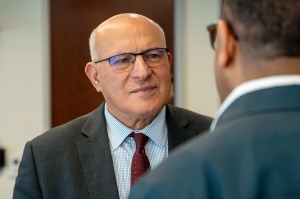The Leadership Files: Dr. Ken Blanchard on ''Lead Like Jesus''
With co-author Phil Hodges, Blanchard highlights the most successful model of leadership – Jesus Christ.
Twenty-four years after the release of what many consider as the best-selling management book of all time, "One Minute Manager" author Ken Blanchard has outdone himself in his latest book, "Lead Like Jesus."
With co-author Phil Hodges, Blanchard highlights the most successful model of leadership – Jesus Christ. In contrast to the world model where leaders exploit privileges of position, the "servant leadership" model that Blanchard and Hodges focus on involves serving the interests of others before your own.
“One of our world’s great problems is ego-centric, self-serving leadership – leaders who think people exist for their benefit, instead of vice versa," said Rick Warren, author of The Purpose Driven Life, in endorsing the book. "In stark contrast, Jesus modeled servant leadership, leading by example. He said, 'I came to serve not to be served.' Now, two thousand years later, Jesus has over 2.1 billion followers, which makes Him the undisputed greatest leader of all time. No one else comes close! This is why you need to know how to lead like Jesus. He is the only flawless example. That’s why you should read this book!”
Critics are calling Lead Like Jesus the most complete book on leadership yet.
“Enlightening, challenging and convicting, the only complete book on leadership I’ve ever read. It will be read one hundred years from now,” said Charlie “Tremendous” Jones of Executive Books.
"Finally. Finally. Finally. A definitive guide to the connection between our faith and our work, one that is both theoretically elegant and immensely practical," said Patrick Lencioni, author ofThe Five Dysfunctions of a Team. "This is, without a doubt, the most important management book I have ever encountered."
The following is an excerpt from a Feb. 15 interview with Ken Blanchard on how he felt led to write this book, and the basic ideas the book covers.
Boil it down for us. What was your primary reason for writing the book?
The world is in desperate need of a different leadership role model. We've seen what self-serving leaders do in business, and so forth. Jesus has the capacity – if we can separate him out from the battles of religion – to be accepted all over the world. Everywhere we go, Muslims, Buddhists – they all love Jesus; they don't like Christians particularly. Our hope is that someday, everywhere, everyone will know somebody who leads like Jesus. And it starts in the heart - serve, and be served.
The book is very practical. There's a step-program to help people memorize verses effectively and instructions on how to plan your day to include solitude time. What does that have to do with leadership?
Yes, there's no place to hide in there. There's a 12-step ego-anonymous in there. It's the human ego that keeps separating us from everybody and ourselves.
This servant leadership is all about a relationship with Jesus. If we talk about servant leadership without a relationship with Jesus to be your guide, then it's just another personal growth, another leadership concept, but this one is really tied in to a walk with Him as your guide.
The book also details four areas where you could lead like Jesus. Starting with the heart, can you summarize each section?
Heart
There are four domains that Jesus is interested in as a leader. And I had only spent time in my work on the head and the hands, and never spent time in the heart and the habits – and that really drives everything. The heart is all about your character. “Why are you leading?” And that's the tough question. “Did you come to serve or be served?”
A lot of people don't think that servant and leader go together because they don’t understand leadership. One aspect of leadership is the vision/direction and the responsibility that makes sure things gets done. But the next part is implementation. That's when you have to turn the traditional pyramid [hierarchy] upside down, where now the leader is on the bottom rung cheerleading, supporting, and encouraging.
We have so many leaders out there who think leadership is about them. They're pushing for power and money. That's the trouble with countries, businesses, and churches. What happens is that [people] keep the traditional hierarchy alive even for implementation, so then all the money and power goes up the hierarchy. But what Jesus wanted his disciples to do was to be out there and serve, rather than be served. That's what the world needs.
Head
The head is the philosophy of leadership - it examines your beliefs and theories about leading and motivating people.
Hands
Now that you know that you're there to serve, what does that mean for you? It means you're there to help people win. One of the biggest things is you'll see a normal distribution mentality. Everybody has to rate people and evaluate and rank them. Jesus did not believe that; he believed that we were there to help everybody win, i.e., the prostitutes and the lepers. Everybody had just as much opportunity as the King. He wanted everybody to be saved. As hands, you're there as a coach/supporter.
Habits
Then the habits is what do you do on a daily basis to recalibrate who you want to be in the world. Jesus had five habits.
(1) One is solitude. He went off by himself a number of times. (2) The second is prayer; the Lord is only a conversation away. (3) He knew Scripture. A big question is, what was he reading when he was tempted by Satan? He said, "It is written," and quoted the Bible. Do we know the Good Book? (4) He had a small group that he could be vulnerable with. He had Matthew, Peter, John and James. (5) Finally, he absolutely trusted in the unconditional love of the Father.
What keeps God away is we look at our performance plus the opinion of others. If Satan gets you hooked on that, he's got you because your performance is not going to be great and people can be fickle.
That's why I think the habits are important. I tell people that the most important thing you can do for your families and coworkers is to enter your day slowly - through solitude, prayer, and study of Scripture. That's where I would start with. A number of people are using Lead like Jesus as a devotional. You'll notice there's a tremendous amount of Scripture there.
The book describes how one goes about studying Scripture. Do you want to talk a little bit about that?
Well, it's a discipline. In the habit section, we talk about how we have two selves. We have a task-oriented self, and then we have a thoughtful self. The task self wakes up earliest in the morning. Why isn't it the opportunity clock that wakes up first and says, "It's going to be a great day?" But you're in the task self and you run to breakfast meeting and lunch meeting and then you get home and fall into bed without any energy to say goodnight to anybody lying next to you. The problem with most Christians is they're in a rat race. They're stressed, and they get self-oriented. The problem with the rat race is when you win it, you're still a rat. That's why it's important that you enter your day slowly. Before you do anything, squirrel yourself away.
Would you like to add anything about the maturation of leadership principles in the world today?
The biggest challenge in the world is that people spend the time trying to tell everybody to be right. We need to be tolerant of each other but keep to our teachings and spread the Word in a positive way, not in a put-down way.
Ken Blanchard is one of the world’s most sought-after authors, speakers and business consultants. His managing and development techniques have contributed to the development many Fortune 500 companies. Blanchard authored more than 40 books on business and management, but is best-known for One Minute Manager, which to date has sold more than 12 million copies and has been translated into 25 languages.
The Lead Like Jesus Ministry is based out of Augusta, Ga., and was co-founded in 1999 by Blanchard and co-author of Lead Like Jesus, Phil Hodges. The ministry defines leadership as a process of influence and teaches that any time one seeks to influence the thinking, behavior, or development of people toward accomplishing a goal in their personal or professional lives, he or she is taking on the role of a leader. For more information, visit www.LeadLikeJesus.com.




























